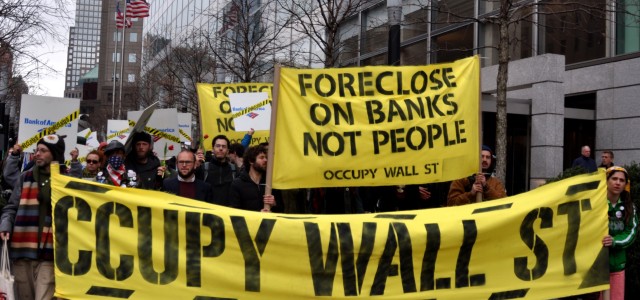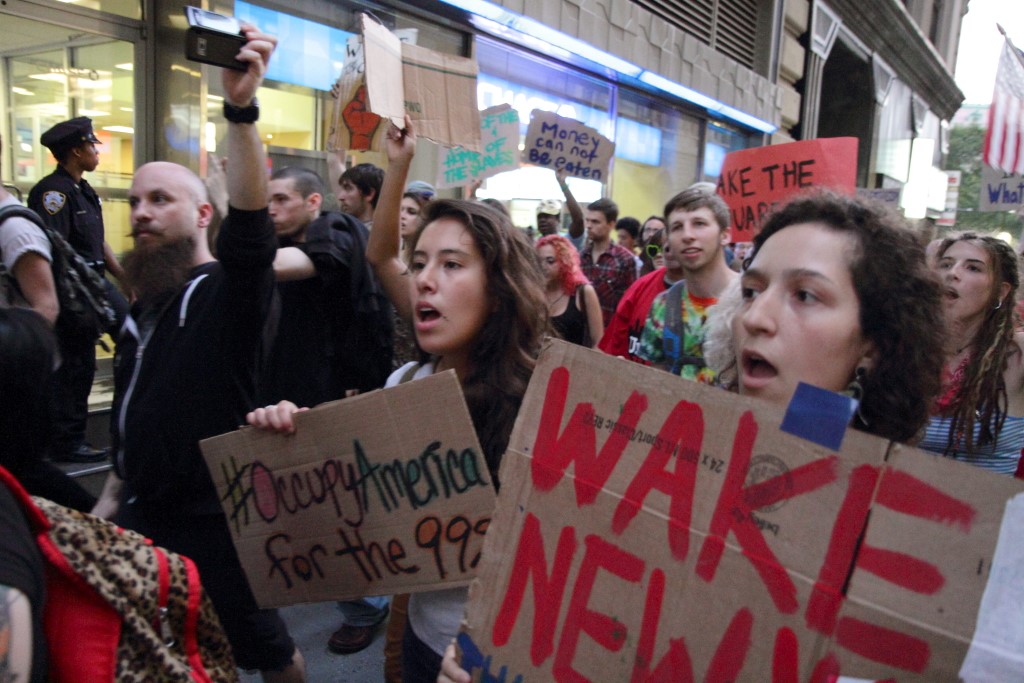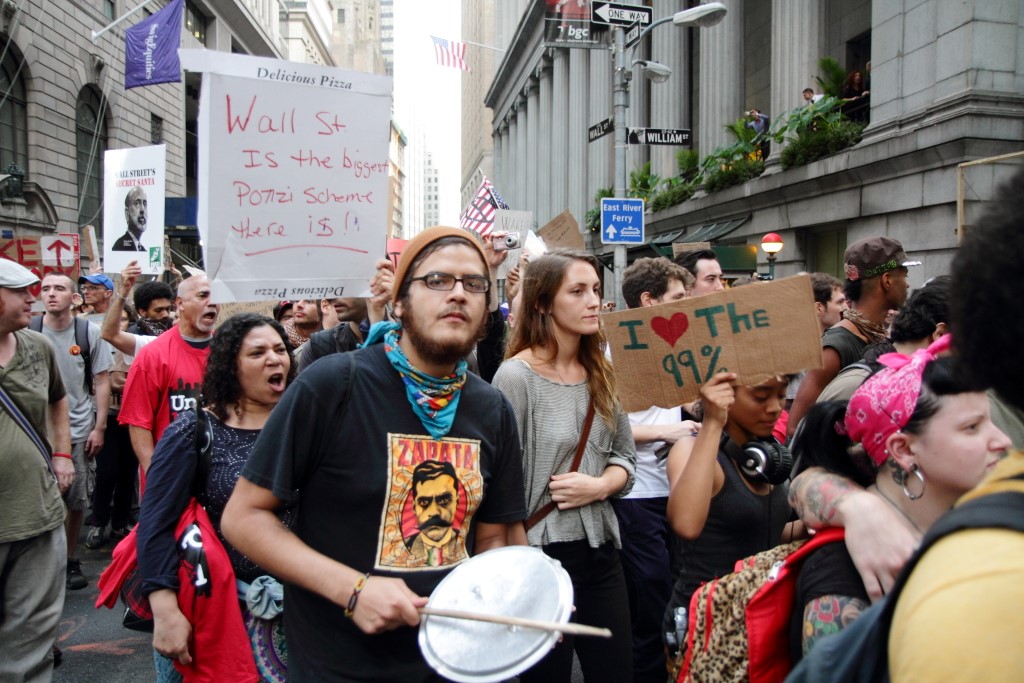Image: Michael Fleshman (CC BY-SA 2.0)
Gregory White (University of York)
Frances Fox-Piven is an academic, commentator and author, and, arguably, one of the most influential figures working on social movements, political mobilisations and the welfare state in America. Her extensive volumes, articles and books are widely cited, and critiqued, across the disciplines of political science, sociology and social policy. Piven is as revered on the left of the political spectrum (owing to her support of new social movements, such as Occupy) as she is attacked on the right. Most recently, Glenn Beck, the American right-wing FOX News commentator, condemned Piven’s work with Richard Cloward from 1966 as a violent plan to overthrow the presiding economic system. Piven’s status is in no doubt; her work is as important today as in previous decades.
This summer, Professor Piven was invited to speak in a special plenary session at the Social Policy Association (SPA) conference in Sheffield, UK. Her presentation, delivered to a full-to-capacity conference hall, focussed on the increasing role of neoliberalism in the functioning of the welfare state. Gregory White, a doctoral researcher in social policy at the University of York, interviewed Professor Piven after her presentation to ask about her support for Occupy, the future of the welfare state, and the possibility of future political mobilisations.
You have been supportive of the Occupy movement in the US. But where is it now? Where has it gone? Will it come back?
There is a movement or maybe its many movements emerging in the United States. I think Occupy was and is part of that, and it was important in part because it attracted so much public attention that, in a way, it was interpreted by observers as the whole thing, and it’s not the whole thing. When Occupy emerged there had already been for example an extraordinary demonstration in Madison, the capital of the state of Wisconsin, and that was a demonstration by students and public sector workers who occupied the state capital in reaction to the very right wing, neoliberal agenda of the governor of Wisconsin, Scott Walker. The key part of that agenda was an effort to strip public sector workers of their collective bargaining rights. That was only one part of Scott Walker’s agenda.
That was a pretty fantastic uprising that occurred in Madison. People, mainly young people, because mainly young people, I mean, they’re biologically equipped to do movement things like to, biologically and sociologically, they don’t have to go to work the next morning in quite the same way that most other people do. They have a kind of freedom; they also have a kind of morale and hopefulness that older people may have had worn out of them.
Wisconsin came first, and, but still it was just Wisconsin, or just Madison, and just this curious thing of in the dead of a Wisconsin winter, people occupying the state capital. But, and then came Occupy. Well, Occupy was a sort of curious development because before Occupy, there had been a little demonstration on the sidewalks around City Hall called “Bloombergville”, it was a demonstration symbolised really by opposition to the extremely rich and neoliberal Mayor of New York, Michael Bloomberg. The demonstration was on the sidewalks around City Hall, because the New York City government has for two decades now obliterated the possibility of demonstrations at City Hall by putting iron fences around City Hall. So, there these young people were on the sidewalks. They asked to me come down and speak to them, and I did, on the sidewalks. There weren’t too many of them, maybe a hundred. Nice people, good people. A lot of those people were involved in the initial occupation of this park, which came to be called Occupy Wall Street. It was a little private park a few blocks from Wall Street – it wasn’t Wall Street. It was a couple of hundred people, maybe. They asked me to come down and speak to them and I came about ten days in to the occupation. By that time there were a few hundred, and more came, and then the unions came.
At first the press ridiculed them for everything, you know, the way dressed; their silly soup kitchen; even their library, or, you know, this and that, they were just funky kids. But, their numbers increased a little bit, I mean, they never became a mass event, but their numbers increased. And, slowly their slogans began to make their way in to the brains, if you can call it that, of the press people: “we are the ninety-nine per cent, they are the one per cent, Occupy Wall Street.” It was kind of magical the way it suddenly, it gripped people. And then the young people who were doing this, they were very sought of clever and imaginative. They were performance artists, which I think all movements are in a way, that’s part of what they are.
I remember there was a huge building near Wall Street with a blank wall, and, I met the guys who did this not too long ago, they’re sort of lighting engineers. And they projected the slogan: “we are the ninety-nine per cent, they are the one per cent” on to the blank wall of this building at night. And, it was huge! So, that was very important, and yes it’s true that the police, the New York City police, emptied Zuccotti Park, although not before the unions came out to defend them. And, yes it’s true that they, young activists, sort of, they dissipated, but they dissipated in to other collective efforts, like Occupy Sandy, which was an effort to re-build communities that had been devastated by Hurricane Sandy. And, they dissipated in to the efforts to mobilise low-wage workers, the precariat, which are very obvious now in industries like the fast food industry, or like Wal-Mart, and are having an impact on minimum wage policies in the United States. So, I think that, one, the important point is that a great movement does not occur like a fourth of July fireworks explosion, it begins here, and it then pops up there, and then its crushed or discouraged and something else happens over here. And that goes on and on and gets bigger, and thirty years later, social scientists in all their wisdom describe this as all one movement, and in a way it is. But at the time, people are forever saying its over, its over; that happened, its over. And that happened in the civil rights movement, nobody remembers now. But the civil rights movement began in 1956. And it went on until the 1970s, and each time it was a flare up which was crushed or dissipated, and then it happened there, and then it happened there. But that’s the way movements are; they occurred in a different historical period, they had profound causes in the broken hopes and expectations of people, but also in their emerging hopes, in their new hopes, and in their discovery of first their solidarity, and second, their discovery of power, of movement power. So, Occupy was very important, but it was part of something much bigger, we should certainly hope, than Occupy.
Are you more or less optimistic today than in the 1960s that progressive visions of the welfare state might win out?
Well, I don’t know if I’m optimistic, you might say I’m desperate. There’s no choice but to be, in a sense, optimistic, because we don’t have any, what else are we going to do but to try to fight for the survival of the planet, and to try to fight for the dignity of people who are being ground down, insulted, excluded. In the United States, imprisoned by the millions. I mean do people in England understand what it is to have a state that relies on incarceration, on such a large scale? So, of course we’re going to fight it, and you have to hope and wait and work for people to discover their capacity to fight it. And, I think that maybe I should say something about what is their capacity, besides raising issues?
I think communication-raising issues is a very important part of what movements do but it is not how movements win. And, by winning I don’t necessarily mean the transformation of society, I mean the reform of societies, because I think you have to fight like hell to get reform. And, I don’t think we’ve fully understood the nature of movement power. When movements have power to force institutional change, it’s because they tap the capacity of ordinary people to disrupt institutional arrangements by refusing cooperation. Now, that essentially is what the strike is, we understand that. But all sorts of people have that capacity, because were a complex, intimately integrated society in which everybody has to play their role for things to work. You know, you have to cross at the light; you have drive on the right side or the left side of the street, whichever it is. You have to obey the rules, which keep institutions functioning, and when people discover that, they discover that they are essential to the smooth functioning of dominant institutions; some more essential than others to be sure. But lots of people are essential; they also discover a kind of power: the power of saying no, of defining the rules and refusing cooperation.
Image: Paul Stein (CC BY-SA 2.0)
Social movements are increasingly adopting more diverse tactics in terms of challenging the dominant political narratives: these are increasingly non-institutional in character. Are there any tactics that you think movements, such as Occupy, should consider in order to bring attention to the growing inequalities nationally and internationally? What might that look like?
Well, first, I want to shift from the emphasis on bringing attention to issues, because I’m saying: yes, movements bring attention to issues that are otherwise hidden. Yes, movements do that, and that’s important. But movements do something else: they throw sand in the gears, so that institutions can’t operate unless changes are made, and I think there is a new tactic that has to be explored, a lot of work has to be done on how to make it possible for people to employ this tactic, and that is debt resistance.
I think that debt resistance, you know, American’s are deeply indebted to their: credit card debt, medical debt, home-owner debt, their houses are what we call under water – they owe more on them than the houses are worth – student debt. Well, when we think of debt, we think of, thanks to English literature, and thanks to Charles Dickens, we think of the poor, stooped debtor; a shame-faced character. And, nobody wants to be a debtor; a deadbeat, we call a debtor, very shameful. That kind of cultural stereotype is part of what keeps the debt system going because people don’t want to not pay their debts. But, the fact of the matter is, that there is latent power in debt, because banks are carrying all that debt on their books, they need those borrowers to pay, they need them to honour that debt. In principle, the debtors, its true the lenders have power over the debtors, but the debtors have power over the lenders because they need each other. So, it’s, in that broad way like a capital-labour relationship: they need each other. But it’s hard to organise debtors, because the debt is always individualised: “I owe on my credit card, I owe on my student debt.” And then there is a panoply of rules and laws which are going to “penalise me if I don’t honour my debt.” In the United States, for example, there are bankruptcy laws that protect businesses that become indebted, but student debt, student debtors cannot declare bankruptcy by law. So, the problem of the individualisation of debt hampers collective action on debt, it’s very, very hard, for example to organise homeowners, who are subject to eviction because their house is being foreclosed, because each foreclosure and eviction is an individual process, it’s going to take place on a different day. You can’t organise, hard to organise, masses to defend these homeowners.
But there are other possibilities, there are forms of debt that are collectivised, sovereign debt of various kinds is a debt that is collectivised. It’s the debt of nation-states, the debt of state governments, the debt of city-county governments, the debt of special districts. Now all that debt is incurred, very much at the mercy of the banking industry in the United States, not only the ignorance of politicians, but also the collusion of politicians in indebting their little polity, and the citizens of that polity to the bank, or the banks. That kind of debt is susceptible to collective action by mobilised citizens. And events like libor scandal, I think, helped expose that, helped expose the degree of collusion and chicanery that has gone in to creating huge debts and governments at all levels. Debts by their citizens, in effect, by their tax-payers, debts that are going to be paid by slashing public services, and debts that are going to be paid by very regressive tax system. So, I think that that is a, a new source of unused power, that organisers should be exploring. And they have to, in exploring it, they have to explore also the ways the way that they protect the individual debtor, from having their wages tarnished, from legal action: being put in jail, and from being despised by the community, from being deadbeats.
Image: Paul Stein (CC BY-SA 2.0)
The neoliberal paradigm, arguably, has failed. The Occupy movement used, in light of this failure, prefigurative politics to imagine alternative futures. What kind of futures can you imagine for resistance and for critical politics?
I only have one alternative vision: I want to democratise economic relations. I think that there are different blueprints being touted for doing that. I do think that we ought to consider nationalisation of the banks. I think we should consider worker and community control of economic enterprises. We have to also consider much stiffer regulation, not only of large-scale banks, but large-scale economic, large-scale businesses, and, we also have to consider ways of breathing more democratic possibilities in to electoral representative arrangements, and the parties that they have created. In the United States, we have to get money out of politics, I think its also a problem in the UK but no where is it a problem on the scale that it is in the United States.
In the United States I would also say: “oh boy, I would love to get rid of the High Court.” It’s constitutionally enshrined, and it has repeatedly in America, and in history, thwarted the will of majorities, at the end of the Nineteenth century. It declared unions to be monopolies, prohibited under American law, and this in spite of the success that the working class had had in winning certain rights under state legislation. Now, in recent years, the Supreme Court has damaged the right to vote, with its ruling on the Voting Rights Act, and it has repeatedly, repeatedly ruled that corporations are persons, protected under the Fourteenth Amendment, and therefore, and money is speech, and therefore limits on the flow of money to buying parties are unconstitutional: the High Court should go. These men are appointed for life; they live very, very long. They have excellent medical care and they don’t work too hard. The High Court is a huge blot on American constitutional arrangements. There are other problems with our constitution, democratic problems, but that certainly at this point, and in our history, is the most blatant.
Gregory White talked to Professor Frances Fox-Piven at the SPA conference, on the 16th of July 2014. Gregory is an ESRC-funded doctoral researcher in the Department of Social Policy and Social Work at the University of York, UK. His research focuses on the relationship between social policy and social movements in a post-economic crisis context. His research interests include the study of contemporary social movements, the economic crisis and social policy, anarchist and autonomist theories and political sociology. He recently authored a research report – funded by the ESRC – on the impact of welfare reform on third sector organisations in Scotland.


